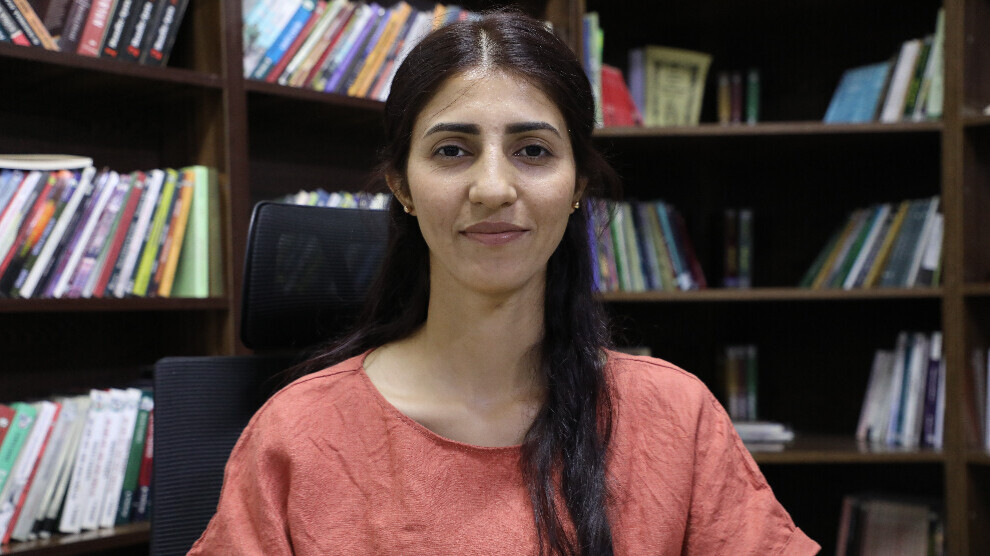WOMAN, LIFE, FREEDOM
Rohilat Muslim: The woman, strengthened by the revolution, defends herself
Rohilat Muslim from Rojava was displaced twice due to Turkish attacks. She talks about her personal development, the importance of education and the changes after the revolution.

NÛJIYAN ADAR
QAMISHLO
Saturday, 6 July 2024,
Rohilat Muslim is 24 years old. She spent half of her life under the Baath regime, the other half in the Rojava revolution. Due to the attacks of the Turkish state on Kobanê, she had to flee Kobanê, where she was born and grew up, at the age of 14.
Rohilat Muslim stayed in North Kurdistan for a while and finally settled in Serêkaniyê. She was forced to leave the city after Turkey invaded it in 2019, and had to flee to Girkê Legê. In this ANF interview, she spoke about the struggle for survival and the importance of self-defense.
Rohilat Muslim talked about how she was shaped by war and oppression: "I am a young woman and have lived in several different societies in the short 24 years of my life. This has shaped my personality in many ways. Our lives in Kobanê, in Bakurê-Kurdistan, in Serêkaniyê and finally, in Girkê-Legê were different. The country, the city, the community and the village in which you live all have an influence on your personality.
Of course, I have taken characteristics from every place I have lived. This even applies to the language we speak and the clothes we wear. Living in a family that is subject to a nomadic life due to occupation and displacement inevitably leads to the development of an unstable personality and problems adjusting. I have not lived in one place for long. My memories and my life have always been torn down anew. By attending the Mesopotamia Academy in 2017, I was able to overcome the contradictions and chaos in my personality because I analyzed the reality of the enemy and the occupation, as well as my personality, and got to know the philosophy of Rêber Apo [Abdullah Öcalan] in more detail."
"The Baath regime also captured our minds"
When she was twelve years old, the Rojava Revolution began. Rohilat Muslim described life before that as follows: "We studied in the regime's schools. The first 12 years of my life were very different from the following. The Baath regime used every subject for its interests. It tried to create its own society. Even when we were asked to paint a picture, the first thing that came to our minds was to draw the flag of the Baath regime. It was a situation that had become entrenched in our mentality, our minds were trapped.
We grew up with the mentality of the state. We never traveled back and forth. The only ones who left the house were the men, and that was only to ensure their financial existence. I could not understand how women were locked up at home. I was young, but there were also women who were older. They, too, could not leave the house. It was a life that was forced into molds. I could never have imagined that one day I would live my life freely."

Moved by revolutionary songs
Muslim remembers that the first thing she noticed about the revolution were the songs. She said: "I thought a lot about why these songs are sung, what these songs are about. After a while, I realized that they were about us. These songs made me feel the spirit of the revolution to my bones. Of course, the beginning of teaching in the mother tongue and the opening of institutes and academies also caught my attention."
"Those who do not know history cannot build a future"
Rohilat Muslim, from the Faculty of History at Rojava University, said: "A person who does not know his history cannot know himself and cannot build his future. My goal is to delve into historical truth. The developments in history have a direct impact on the present. I chose the history department to build a future on a stable basis."
"Awareness is a prerequisite for self-defense"
Rohilat Muslim has been working in the education committee of the Kongra Star women's movement since 2018. She recalled: "I have been participating in educational activities for about seven years, two years in Serêkaniyê, one year in Girkê Legê and four years in Qamişlo. I am very interested in educational activities.
I love participating in this work. Educating women and society requires voluntary work. Education, which can also be considered as love, self-defense and growth, is an absolute necessity for a sustainable life. Through education, we can improve our self-defense and educate ourselves. The basis of self-defense is the guarantee of intellectual freedom.
A woman and a society that are not free in thought cannot realize their self-defense. The enemy, with its permanent special war policy, tries to involve women in prostitution, spying and drug use. In this perfidious war policy, many methods are used to humiliate women. The policy directed against women is directed against society. Education and awareness-raising are a must so that women do not fall into these traps."


No comments:
Post a Comment